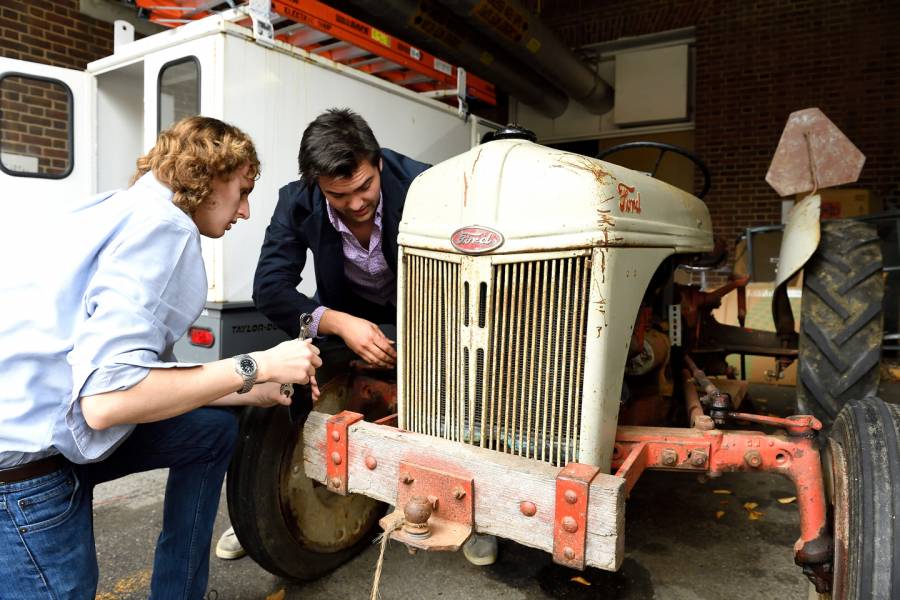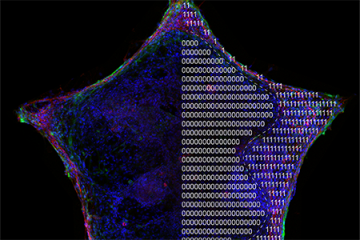- Name
- Lisa Ercolano
- lde@jhu.edu
Heads turned and a few students stopped and stared as a farm tractor growled its way up the campus roadway behind Krieger Hall, then sputtered to a stop in front of Merrick Barn.
"Um, now what?" asked driver Tatiana Pereira, laughing a little as she stepped on the clutch and tried unsuccessfully to turn over the engine of the 1947 red-and-white Ford tractor. Four classmates, who had trotted alongside the vintage vehicle on its short journey, began to strategize and tinker. Ten minutes later, the tractor rumbled back to a parking spot behind the building.
It was all in a day's work for Pereira, a sophomore biomedical engineering major, and her classmates in "Tractor Class," a new course offered through the Whiting School of Engineering this fall. Officially the course is called Reverse Engineering and Diagnostics, but no one except the registrar calls it that.
Video credit: Patrick Ridgely and Dave Schmelick
The brainchild of Stephen Belkoff, who teaches in the Department of Mechanical Engineering, the three-credit class helps students learn hands-on engineering problem solving, tasking them with taking apart and reassembling two donated, 71-year-old Ford N-series farm tractors in an effort to get the motors humming again.
Because the machines are so old, Belkoff's students must rely on their developing engineering skills to ascertain which parts are missing, which ones still work, and what needs repair. Belkoff also routinely sabotages the tractors' systems, challenging the students to figure out and fix whatever is wrong using logic and fundamental principles of physics and thermodynamics.
The old tractors are the perfect teaching tool, he says—they were so well designed that many are still working seven decades after production. They also provide good examples of hydraulic, fuel, drivetrain, ignition, and steering systems—systems most present-day students don't have much, or any, experience with.
"Years ago, most students would arrive in engineering school with some experience mucking around with car engines or repairing their bikes or the family lawn mower," Belkoff says. "That's not true anymore. You don't need to know how to repair a lawn mower to be a good mechanical engineer, of course, but I contend it sure makes design easier when you have a working knowledge of gears, valves, and pulleys, and how things are assembled."
Marcos Perez is among those who came into the class with little or no previous hands-on experience with engines or other machinery.
"I knew how engines worked from my thermodynamics class, and I've had a few lab experiments where I learned about engines. But that's it," the junior mechanical engineering major says. "The class has given me confidence in getting my hands dirty, which will be very helpful in the future once I start working in the industry."
Another student, Sarah Rossman, has spent time working with engines as part of Hopkins Baja, a student team that designs and races an off-road vehicle. Even so, the senior electrical engineering and engineering mechanics major is finding Tractor Class extremely helpful.
"It's teaching me to slow down and think through a problem," she says. "I like the emphasis on diagnostics, as I sometimes jump to conclusions when working through a problem. [I'm learning to] approach things more methodically, which will be helpful to me as a professional engineer."
Belkoff isn't at all surprised that his students are enjoying the class so much.
"They're engineers at heart, and they love machines," he says. "They love the discovery involved in figuring out how systems function. They've heard about clutches, but to see one up close and poke at it and see how it works provides more insight than just reading about one. There seems to be something magical about the tractor. I'm not sure if it's the farm connection or some sense of nostalgia that appeals to something primal."
Posted in Science+Technology, Student Life
Tagged mechanical engineering










